|
|
|
Sort Order |
|
|
|
Items / Page
|
|
|
|
|
|
|
| Srl | Item |
| 1 |
ID:
039982
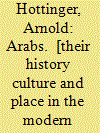

|
|
|
|
|
| Publication |
London, Thames and Hudson, 1963.
|
| Description |
344p.Hbk
|
|
|
|
|
|
|
|
|
|
|
|
Copies: C:1/I:0,R:0,Q:0
Circulation
| Accession# | Call# | Current Location | Status | Policy | Location |
| 000903 | 909.04927/HOT 000903 | Main | On Shelf | General | |
|
|
|
|
| 2 |
ID:
045047
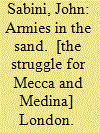

|
|
|
|
|
| Publication |
London, Thames and Hudson, 1981.
|
| Description |
223p.: ill., mapshbk
|
| Standard Number |
0500012466
|
|
|
|
|
|
|
|
|
|
|
|
Copies: C:1/I:0,R:0,Q:0
Circulation
| Accession# | Call# | Current Location | Status | Policy | Location |
| 026036 | 953.809034/SAB 026036 | Main | On Shelf | General | |
|
|
|
|
| 3 |
ID:
112141
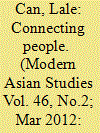

|
|
|
|
|
| Publication |
2012.
|
| Summary/Abstract |
The role of Sufi networks in facilitating trans-imperial travel and the concomitant social and political connections associated with the pilgrimage to Mecca is often mentioned in the literature on Ottoman-Central Asian relations, yet very little is known about how these networks operated or the people who patronized them. This paper focuses on the Sultantepe Özbekler Tekkesi, a Naqshbandi lodge in Istanbul that was a primary locus of Ottoman state interactions with Central Asians and a major hub of Central Asian diasporic networks. It departs from an exclusive focus on the experiences of elites, to which much of the conventional historiography on Ottoman-Central Asian relations has confined itself, and examines the butchers and bakers, craftsmen and students who set out on the hajj to Mecca in the late nineteenth and early twentieth centuries. Drawing on sources from the private archive of this lodge, the paper reconstructs the experiences of a diverse range of remarkably mobile actors and explores the myriad ways in which this Ottoman-administered institution facilitated their travel to and from Mecca. Through its focus on the conduits and mediators, the structures and buildings-the actual sites-where connections were forged, the paper sheds light on the role that such state-administered Sufi lodges played in delivering on the paternalistic rhetoric and system of sultanic charity that was an integral part of late Ottoman politics and society.
|
|
|
|
|
|
|
|
|
|
|
|
|
|
|
|
| 4 |
ID:
053238
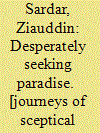

|
|
|
|
|
| Publication |
London, Granta Books, 2004.
|
| Description |
354p.Pbk
|
| Standard Number |
1862077576
|
|
|
|
|
|
|
|
|
|
|
|
Copies: C:1/I:0,R:0,Q:0
Circulation
| Accession# | Call# | Current Location | Status | Policy | Location |
| 048464 | 920.008/SAR 048464 | Main | On Shelf | General | |
|
|
|
|
| 5 |
ID:
118810
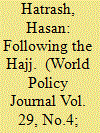

|
|
|
| 6 |
ID:
123031
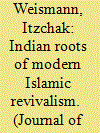

|
|
|
| 7 |
ID:
080265
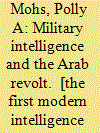

|
|
|
|
|
| Publication |
London, Routledge, 2008.
|
| Description |
xviii, 238p.Hbk
|
| Series |
Studies in intelligence series
|
| Standard Number |
9780415372800
|
|
|
|
|
|
|
|
|
|
|
|
Copies: C:1/I:0,R:0,Q:0
Circulation
| Accession# | Call# | Current Location | Status | Policy | Location |
| 053025 | 940.4864109174927/MOH 053025 | Main | On Shelf | General | |
|
|
|
|
| 8 |
ID:
152365
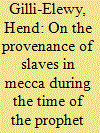

|
|
|
|
|
| Summary/Abstract |
There is hardly a source on early Islam that does not mention slaves in one way or another. They were ubiquitous companions of events, occasions, and incidences. But they played marginal roles in historical accounts. The numerous fragments of information, anecdotes, and offhand references concerning slaves during the rise of Islam call to be collected and analyzed to piece together a picture of various aspects of slavery during this period. References to slaves are especially prevalent in legal texts, as slaves provided useful cases to Muslim jurists to think through legal questions. The discussion of examples of slaves, walāʾ (clientele relationships), and manumission in hadith, exegesis, and jurisprudence has not only provided significant insight into the legal status of slaves, but has also helped scholars to develop a methodology for verifying and evaluating the source material itself. In this essay, I examine pieces of information available in historical and biographical works on early Islam to address the question of the provenance and procurement of slaves in Mecca, Medina, and the Hijaz during the time of the Prophet Muhammad. Reconstructing this story involves dealing with narratives transmitted in various short, spurious, and often unrelated accounts. The source material for early Islam is, as is often pointed out, problematic and at times contradictory. It is laced with topoi and leitmotifs, and frequently proves tendentious, reflecting the opinions and biases of those who wrote them more than what actually happened. Nevertheless, reading beyond the topoi, leitmotifs, and tendentiousness, we find that “in the Traditions there is an undeniable core of ‘fact’” with which we can work and assume to be valid until shown to be false.
|
|
|
|
|
|
|
|
|
|
|
|
|
|
|
|
| 9 |
ID:
083314
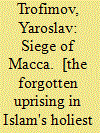

|
|
|
|
|
| Publication |
New York, DoubleDay, 2007.
|
| Description |
xii, 301p.hbk
|
| Standard Number |
9780385519250
|
|
|
|
|
|
|
|
|
|
|
|
Copies: C:1/I:0,R:0,Q:0
Circulation
| Accession# | Call# | Current Location | Status | Policy | Location |
| 053864 | 953.8053/TRO 053864 | Main | On Shelf | General | |
|
|
|
|
| 10 |
ID:
152615
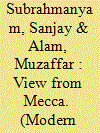

|
|
|
|
|
| Summary/Abstract |
This article examines the history of Gujarat-Red Sea relations in the first quarter of a century after the Ottoman conquest of the Hijaz, in the light of Arabic narrative sources that have hitherto been largely neglected. While earlier historians have made use of both Ottoman and Portuguese archives in this context, we return here to the chronicles of Mecca itself, which prove to be an unexpectedly interesting and rich source on the matter. Our main interest is in the figure of Jarullah ibn Fahd and his extensive annalistic work, Nayl al-munā. A good part of our analysis will focus on the events of the 1530s, and the dealings of Sultan Bahadur Shah Gujarati's delegation to the Ottomans, headed by ‘Abd al-‘Aziz Asaf Khan. But we shall also look at the longer history of contacts, and conclude with brief remarks on the relevance of the career of the celebrated Gujarati-Hijazi intellectual, Qutb al-Din Muhammad Nahrawali. We thus hope to add another important, concrete dimension to our understanding of India's location in the early modern Indian Ocean world, as a tribute to the career and contribution of David Washbrook, our friend and colleague.
|
|
|
|
|
|
|
|
|
|
|
|
|
|
|
|
| 11 |
ID:
108482
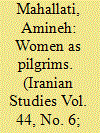

|
|
|
|
|
| Publication |
2011.
|
| Summary/Abstract |
A hitherto neglected aspect of the Iranian women's lives and activities is their traveling and travelogues. A number of Iranian women pilgrims to Mecca and the Shi'ite holy shrines of Mesopotamia during the past four centuries have left behind memoirs of their travels. They recorded interesting details about their spiritual experience as pilgrims to the holy lands of Islam and of the difficulties of the journey, especially the notoriously dangerous land route from Iran to Mecca through the Arabian Desert. This paper examines four examples of that genre, the oldest dating from the early eighteenth and the other three from the late nineteenth centuries. As expected, the authors were all members of upper class families: one was a princess, another a former queen, and the other two were also affiliated with the ruling families in one way or another. However, they shared the same goals with all other female, and male, pilgrims: to perform their Muslim religious duty of hajj and to do it right. They all wrote about their spiritual satisfaction but also of the disadvantages and the extra burden that a woman experienced in her pilgrimage journey, simply for being a woman.
|
|
|
|
|
|
|
|
|
|
|
|
|
|
|
|
|
|
|
|
|